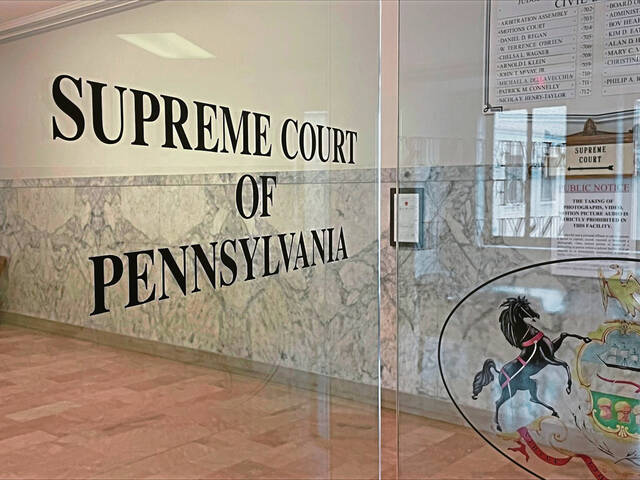The Pennsylvania Supreme Court on Tuesday ruled in favor of a Crawford County school district in finding posts made by its board members — including those about district issues — on their personal social media pages are not automatically subject to the state’s open-records laws.
Had the decision gone the other way, it could have made a huge impact on what constitutes public records in Pennsylvania.
But since it did not, said Melissa Melewsky, media law counsel for the Pennsylvania News Media Association, the situation remains status quo.
“I don’t think this issue is settled for the purposes of Pennsylvania law,” Melewsky told TribLive Wednesday. “They missed that opportunity here.
“There will be more litigation as a result.”
Jordan Shuber, the attorney who represented the Penncrest School District, at oral argument, praised the decision.
The Right-to-Know Law was not meant to cross into a public figure’s personal life, he said.
“I think it would have opened Pandora’s box,” he said. “It’s hard enough as a public official today to keep any semblance of a private life.”
Book ban
At issue before the court was a request by a man in Saegertown for Facebook posts made by members of the Penncrest School District.
In May 2021, a high school library in Penncrest — about 100 miles north of Pittsburgh — displayed several books addressing LGTBQ+ issues in anticipation of Pride Month in June.
A visitor posted a picture of the display on Facebook with negative comments about the books. Within a few hours, at least three members reposted the comments and promised an investigation.
“This is on display at Maplewood High School. Besides the point of being totally evil, this is not what we need to be teaching kids,” wrote school board member David Valesky. “They aren’t at school to be brainwashed into thinking homosexuality is okay. Its (sic) actually being promoted to the point where it’s even ‘cool.’”
The issue was debated extensively at several school board meetings, and, in January 2023, the district revised its policies on books with “sexualized content.”
They banned 13 books, including “To Kill a Mockingbird” and “Beyond Magenta: Transgender Teens Speak Out.”
As the debate unfolded, Thomas Cagle, a retired government employee, filed a request with the district under the state’s Right-to-Know Law seeking comments related to “homosexuality,” school curriculum and other topics that were contained in emails and Facebook accounts for Valesky and board member Luigi DeFrancesco.
The district rejected the request, claiming the posts were not official district records because they’d been made on the board members’ personal social media accounts.
The Pennsylvania Office of Open Records overturned that decision, finding Cagle was entitled to them, and Crawford County Common Pleas Court agreed.
However, Pennsylvania’s Commonwealth Court said the lower court was wrong and created its own test on how to determine whether the Facebook posts were “records” accessible under the law.
That test, the intermediate appellate court wrote, should ask: Does a social media account have the “trappings” of an official agency account? Do the posts show activity of an agency? And were the materials created or received by the public official in their official capacity?
Cagle appealed to the state Supreme Court, which heard arguments on the issue in October.
No new test
At that argument, Cagle’s son, Brian, an attorney, told the justices the new test created by the Commonwealth Court undermines Pennsylvania’s Right-to-Know Law.
But the state Supreme Court, in its decision, disagreed. The majority said the Commonwealth Court decision did not actually create a new test.
“In our view, the Commonwealth Court did not adopt a social-media specific test, and to the extent the lower court’s analysis can be interpreted as such, we reject that notion,” Justice Sallie Updyke Mundy wrote for the majority.
“In fact, we find little about the intermediate court’s analysis ‘new,’ since many of the factors articulated in its opinion have been considered in various other RTKL cases involving other types of information.”
The Supreme Court went on to say the Common Pleas judge who originally heard Cagle’s case failed to consider several factors necessary to determine if the posts were the activity “of an agency.”
Determining when something is a record subject to the Right-to-Know Law, the court said, requires fact-specific, case-by-case analysis.
Now, said Shuber, the attorney for Penncrest, they will return to the trial court to analyze the records at issue.
Devil in the details
Melewsky said she interprets the court’s decision to take the Commonwealth Court’s factors as guidance in that analysis.
“With social media, it’s not a list of exhaustive factors but things you can consider,” she said.
The decision does not block the public from accessing these records, Melewsky said.
“The Right-to-Know Law has always reached social media content by public officials, and it continues to reach social media content by public officials,” she said.
Because the board members were discussing these issues on private pages, the law isn’t clear cut, Melewsky said.
“The devil’s going to be in the details,” she said. “It could have been worse.”
Joshua Bonn, an attorney who regularly argues open-records cases, followed the Penncrest matter closely.
He believes the court’s decision will decrease public access to elected officials’ electronic communications.
“They’re writing emails, writing social media posts to impact public opinion,” Bonn said. “If they’re doing that, that should be a public record.
“They shouldn’t be allowed to do that in secret.”








